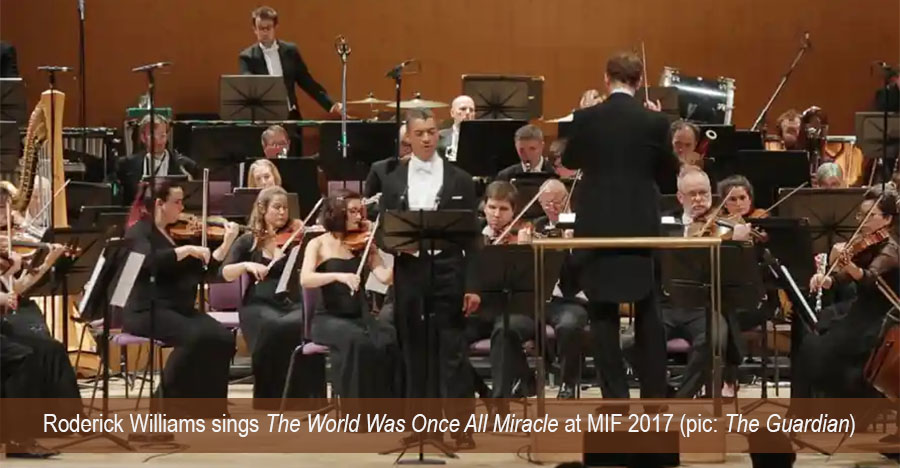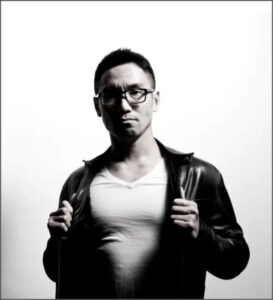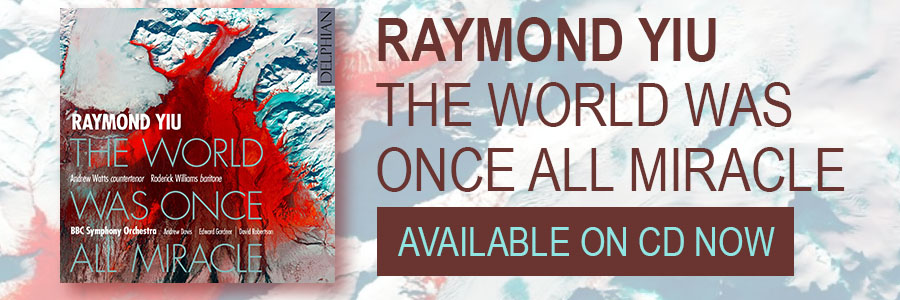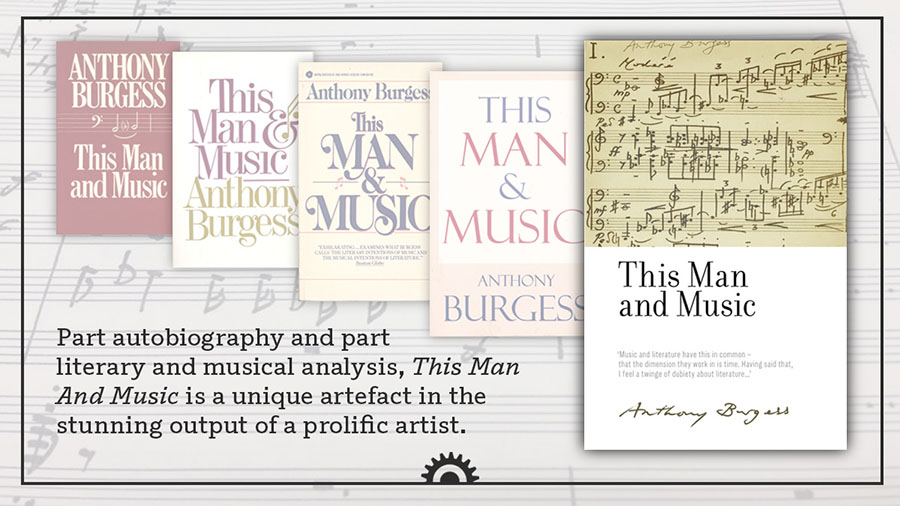Writing The World Was Once All Miracle: Andrew Biswell in conversation with Raymond Yiu
-
Andrew Biswell
- 12th March 2021
-
category
- Blog Posts
Let’s rewind the clock to the 2017 world premiere of The World Was Once All Miracle, composer Raymond Yiu’s song cycle based on the works of Anthony Burgess.
The BBC Philharmonic concert was hosted on 4 July 2017 by Manchester International Festival, and was part of a year-long celebration of the centenary of Burgess’s birth.
Just before the concert at the Bridgewater Hall, Raymond Yiu had a conversation on stage with Andrew Biswell, director of the Burgess Foundation and biographer of Anthony Burgess. The transcript of their encounter, reproduced below, casts light on why Raymond chose Burgess’s poetry as inspiration, his opinions on Beethoven, and how the Foundation’s archive fed into his composition.

Andrew Biswell: I suppose the first thing I want to ask you, in the context of this concert, is what attracted you to Burgess, because, unusually, you’d heard of him as a musician before you knew him as a literary writer. That in itself is quite odd and interesting.
Raymond Yiu: The origin of my attraction to Burgess goes back twenty years, when I discovered this book, which is called This Man and Music, published in 1982. It was at a time when I was originally interested in the work of Paul Bowles. I was curious to know if there were any other writers who also composed, and then I just discovered this book. One of the things that really fascinated me, or even haunted me about this book was the third chapter, entitled ‘Let’s Write a Symphony’. Burgess spent the whole chapter talking about his Symphony in C, which we’re going to hear today in the concert. For years I tried to track down a recording, or materials to do with that symphony, and did not go anywhere. So, about two years ago when you approached me about the possibility of a piece of music to celebrate the centenary of Burgess’s birth, the first thing that came into my mind was to ask, ‘Does the International Anthony Burgess Foundation have a recording of the Symphony in C?’ and you said, ‘Yes’. Then I knew it was not a work of fiction. That was the way it all started.
AB: Burgess is an autodidact, and I think that is important to your relationship with his work. Are other things important as well?
RY: As an autodidact myself, I think it’s one of the main reasons I was attracted to his music. I suspect that he was attracted to music by two other self-taught composers, Elgar and Walton, who approached musical structure and orchestration in their own idiosyncratic ways for a very similar reason. I like Burgess’s writing, because it seems to go anywhere and everywhere. You can never quite guess to which direction it is going to go next. His music has that quality too.
AB: The book you mentioned, This Man and Music, it is an odd book. How would you describe it for those who don’t know it? It’s partly an autobiography, but it’s also written through the focus of his musical life.
RY: People working in a bookshop would not know quite where to put it — it could go into fiction, non-fiction, or the music department. Where would you put it? It is a mixture of his ideas on music and words. It is a set of meditations on the relationship of the art of words and the art of music, and how the two relate to one another, with a good measure of autobiographical detail thrown in here and there.
AB: Tell us how your new piece, The World Was Once All Miracle, came about, because I know you were reading very widely in Burgess’s novels — his Malayan Trilogy, the Enderby novels and Earthly Powers — before you settled on the poetry. Tell us something about that journey through the work.
 RY: I thought if I was going to write a piece around Burgess, it would be weird not to look into the words. But, after reading some of his novels I found things very alarming, because they were very long and unfocused, and it was very hard to extract parts to make it a coherent musical structure. You sent me a copy of the edition of his poems, Revolutionary Sonnets and Other Poems. I was reading it over and over again and then, gradually, some of the phrasing stood out for me. The process of choosing the text in this project was quite difficult. It was a very long process.
RY: I thought if I was going to write a piece around Burgess, it would be weird not to look into the words. But, after reading some of his novels I found things very alarming, because they were very long and unfocused, and it was very hard to extract parts to make it a coherent musical structure. You sent me a copy of the edition of his poems, Revolutionary Sonnets and Other Poems. I was reading it over and over again and then, gradually, some of the phrasing stood out for me. The process of choosing the text in this project was quite difficult. It was a very long process.
AB: And was it the shape or forms of the poems that suggested particular accompaniments? How did that work?
RY: The criteria to choose a text was actually informed by your biography of him, The Real Life of Anthony Burgess. His fascination with music, with languages and with the conflict of good and evil — a theme that runs through a lot of his poems — and his works in general. Those were the three topics in the back of my head when I was looking for the texts.
AB: Would you say the cycle tells a story? Is there a narrative?
RY: It is very hard to say. The music is a response to the texts with the feeling of some kind of dramatic structure. But I’m not writing a play. So it is very hard to tell you exactly what’s happening at any specific moment in this song cycle. I just wanted to make the music create a type of dramatic impression and shape in the audience’s minds.
AB: What about your approach to setting the poems? Is it different for each piece within the cycle?
RY: The World Was Once All Miracle consists of six songs and they are all, in principle, very different in character. I’ll go over them very quickly.
The first is a reasonably accurate portrait of Burgess as a person. When you see him in interviews, he appears to be quite neurotic, nervous, and often speaks quite fast. You can sense his mind running at very high speed and changing the directions of his speech all the time. Hence, the first song has a psychotic and manic feel.
The second is a nocturne. It has a drowsy feeling to it, and is based on a poem about sleeping, but in metaphor it is about guilt.
The middle two are my favourites. The third one is based on the fact that Burgess and his first wife Lynne lived in Malaya for several years in the 1950s. Burgess had a very strong interest in Malaysian culture and Asian culture. It is a setting of a love poem with this slightly strange, imaginary folk music floating in the background. I’m not going to tell you any more because you are supposed to be surprised by it.
The fourth song is a setting of a poem called The Music of the Spheres. It is a Burgessian take, in poetic form, on his idea of music. In This Man and Music he talks about his discovery of a new type of music through Debussy, and also he had this obsession with Beethoven all his life. So, the fourth song features the quotations from these two composers, as well as Purcell and Arne, who are mentioned in the poem. Anyone who is interested in that kind of thing, do listen out for it.
The fifth song is very dark. He was affected by the Second World War, and was always very aware of the cruelty of human beings. The lines I use are a fragment of a very long poem which sets out his bleak view of humanity in general.
The final poem is a relief, as well as a tribute to the music of Noël Coward and Cole Porter, which Burgess adores. It is a poem of farewell, a farewell to life, in a sense. It’s not very specific about death but it is kind of implying it.
AB: When you were researching your pieces, you spent a lot of time in the archives of the International Anthony Burgess Foundation here in Manchester, looking at Burgess’s music scores. Tell us what you found and how that fed into your piece.
RY: Back in October [2016] I came in for an afternoon just to go through his manuscripts and particularly the musical manuscripts. I was flicking through them casually and for a moment I saw this page of musical notation. It caught my attention, so I took a picture and went home without thinking too much about it. Two weeks later when I looked at it close up, I discovered it was a sketch where Burgess was trying to write atonal serial music. The melody consists a forward statement of the tone row (i.e. a specific sequencing of all twelve available notes in an octave), followed by a reversed version of it — hence palindromic in nature — supported by four chords derived from a straightforward three-note grouping of the row. He was trying out writing music with serialism. For me it’s fascinating and I incorporate that tone row and that sketch into the fifth song.
AB: We should say something about Burgess as a composer. It is such a wide and varied output — he wrote, we think, at least 250 separate compositions. But in his lifetime so little of his music was performed, and many people, until recently, hadn’t heard it. What is your impression of Burgess and his musical life?
RY: I would say that after hearing the Symphony in C being played yesterday for the first time, my jaw just dropped. What struck me was that his sense of imagination was staggering, and he has got very good ears. There are people out there who will try and compare Burgess to the ‘professionals’, such as Elgar or Britten. They will say ‘Well, this is like a second- or third-rate Walton.’ But, I think it is wrong to assess Burgess’s music from that angle. He was trying to be a composer early in his career, but he could not, due to the circumstances. Bear in mind that this is the music of a composer who did not have many opportunities to hear his music until much later in his career. On account of that, it is incredible what he has come up with. I would like to think if he had heard his music performed much earlier in his life, he would have learned so much more from the musicians that he could have worked with. Composing is a much more practical art than one imagines, and this is how I build my trade. The only way I learnt was to get my music played, and to find out what does and does not work. I think Burgess would have benefited a great deal from that. I would rather hear music by a composer with a better imagination and lesser craft than a composer with an excellent technique but with imagination dull as dishwater.
AB: There was something you said the other day that I was very struck by. You said that Burgess was a composer who was still learning his craft. Could you expand on that?
RY: He was always learning his music. In his Symphony you can detect fingerprints of Walton, and some Elgar, a sense of those English composers of the early twentieth century. At the same time, there is something else. It is very hard to put my finger on it, to tell you exactly what it is. But, the thing for me that really stood out yesterday — or just knowing the piece — was just the way the music turned, it was so unexpected, almost weird, but somehow it made sense. I did an interview with the American composer Lukas Foss, who was my mentor, about fifteen years ago. I asked him: ‘So, what is a musical idea?’ and his reply was: ‘A musical idea is a surprise that makes sense.’ Somehow, when I listen to Burgess’s music, this is what I get. So many surprises.
AB: I want to ask about your own process. How do you write music? Do you do it at a desk, or at a piano?
RY: One of the first steps, when I compose, is to visualise the whole piece. Mozart saw the whole piece in his head and all he had to do was just write it down. Certainly, when I compose I see the structure, like an architect. I see the pieces, like buildings. My job as a composer is trying to work to out all the small details. Sometimes, I visualise the performance, like a black and white silent movie, which I try to write the soundtrack for.
AB: Is it the piano score first or a full score?
RY: I always start with a short score, a kind of extended piano score. One of the things that I have learnt from the music of Stravinsky and Janáček, if you look at their manuscripts, a lot of time they did not use manuscript paper; they draw their own staves. Janáček once said he hated manuscript paper because it is tempting to fill the entire page. You only draw enough staves for what you need, so you don’t have that kind of temptation. I think that was quite a useful tactic.
AB: We should probably say something about Beethoven.
RY: Well, I think people might hate me for saying this but, I do not like Beethoven’s piano music — I find it very boring. But his symphonies are extraordinary. I tend to go for the unusual ones. For the concert tonight, number 8 is the one I proposed because I love this work. It is so compact, and so joyous. I am a jazz pianist, I like melodies, and the opening of this symphony is simply extraordinary. Once you hear it, you just cannot get it out of your head. I like music when it is not trying to make a huge statement, when it is very concise and nicely put.
AB: Maybe we could end by saying something about Burgess’s twin reputations as a writer and composer. He would have celebrated his hundredth birthday in 2017. How should we remember him?
RY: We should remember Burgess not as a writer. We should remember Burgess as an artist who has multiple talents. As we are discovering more and more of his music, it can give us the chance to understand the man as an artist from a different angle, coming from the books and going to the music, or going from the music to the books. Most people are going from the words to the music; I am coming from the music to the words. It just depends on how you want to approach it.
AB: That sounds like a very uplifting way to end.
The BBC Symphony Orchestra has recorded The World Was Once All Miracle and other orchestral works by Raymond Yiu on a brand new Delphian Records CD, described by the music critic of the Guardian as ‘fresh, totally original and hugely impressive‘.
Raymond Yiu recently chatted to the Burgess Foundation’s Will Carr about his Burgess-inspired song cycle. Listen here:




